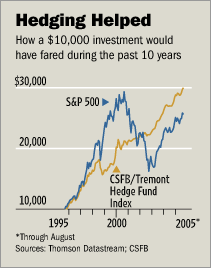Hybrid funds, i.e. mutual funds that use hedge fund-like techniques, are becoming more popular in the investment community. Rydex Funds recently launched two such funds.
According to this article in the FT.com:
Given the great popularity of hedge funds, the mystery is why more of these hybrid hedge/mutual funds have not been launched, and why they have not been more popular with investors.
Recently disappointed investors are undoubtedly attracted to these returns:

Karen Damato in the Wall Street Journal notes that:
..like hedge funds, a number of the new absolute-return funds and other hedge-like mutual funds invest in foreign currencies, commodities and option strategies as well as in stocks or bonds. Many of them buy some stocks while wagering that other stocks will fall in price by shorting them — selling borrowed shares with an eye toward replacing them later with cheaper shares. When the market outlook is grim, some have the flexibility to position their portfolios so that they will do better if stock and bond prices fall, rather than rise.
Such funds have multiplied following the boom in hedge funds themselves. It’s all largely a response to the bear market of 2000 to 2002, when many mutual-fund investors suffered steep losses but hedge funds generally delivered gains, and to this year’s flat market.
The continued popularity of these funds is in part dependent on the continued muddled equity markets. A rip-roaring bull market would undoubtedly take a big chunk out of advisor and investor interest in these funds.
There is however a tail-wind behind these funds in terms of their structure. As more hedge fund advisors are required to register with the SEC, and the number of high-profile hedge fund blow-ups increase, the transparency of hybrid, open-end funds will become more attractive.








